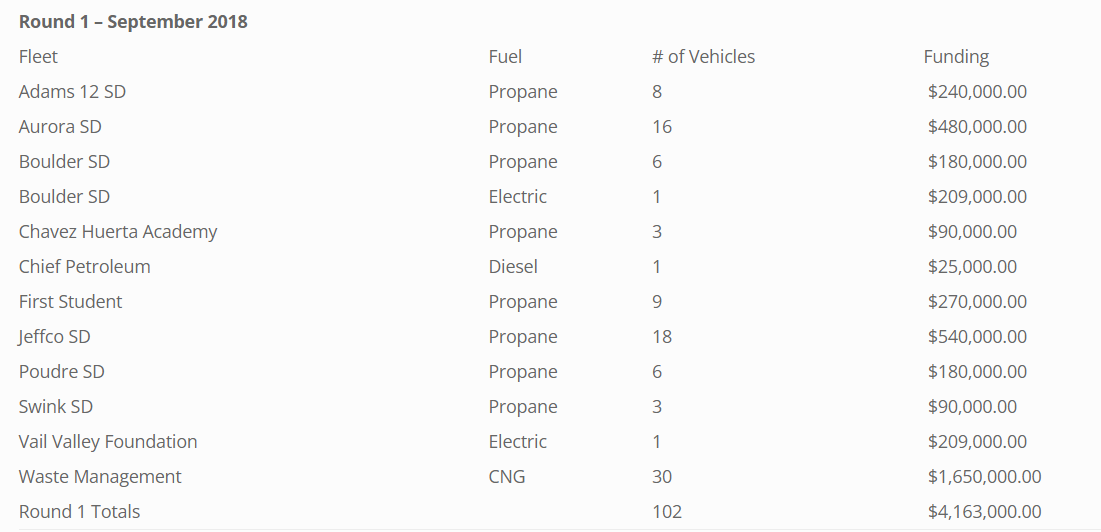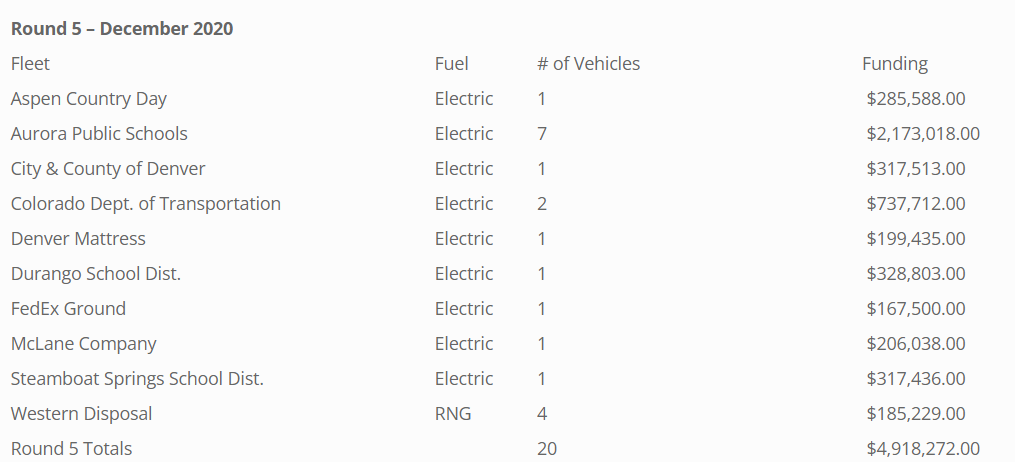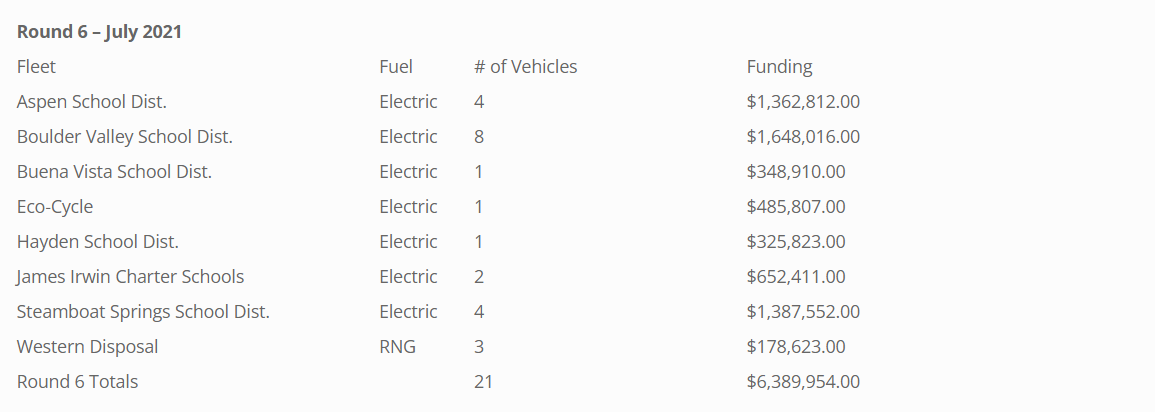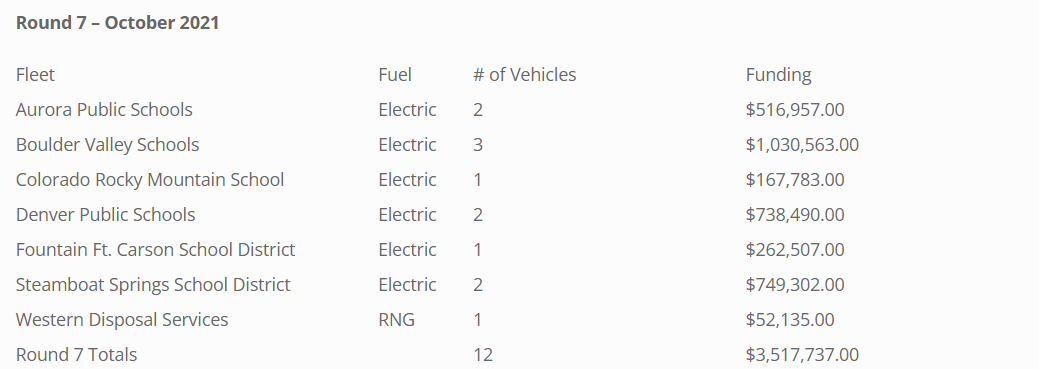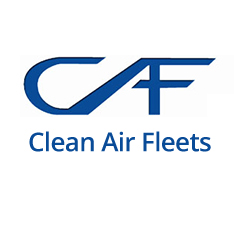
Clean Air Fleets
Between 2014 and 2024, the Regional Air Quality Council ran a series of programs under the Clean Air Fleets umbrella: Alt Fuels, Charge Ahead Colorado, and Diesel Retrofits. These programs reduced mobile emissions in the Colorado ozone nonattainment region. Information about these programs was housed on cleanairfleets.org, until 2024, when most information was transferred here.

About Clean Air Fleets
Clean Air Fleets was a public-private initiative of the Regional Air Quality Council (RAQC) to improve local air quality across the Denver Metro Area / Northern Front Range through a variety of programs that reduce ozone precursors. To accomplish this goal, Clean Air Fleets:
- Identified opportunities and leveraged funds from a variety of sources to create effective projects that reduced harmful emissions in the Denver Metro Area. Education and outreach were an integral part of these programs to ensure community understanding, adoption and sustainability.
- Engaged and enabled local governments, school districts, private, off-road and over-the-road fleets to voluntarily reduce emissions in a cost-effective and efficient manner to the benefit of the region’s public health. Programs included extensive diesel retrofits, idle reduction technologies, electric and alternative fueled vehicles.
- Developed collaborative initiatives to reduce harmful emissions and improve air quality for the benefit of the region.
- Clean Air Fleets continuously evaluated new opportunities to improve regional air quality.
ALT Fuels Colorado
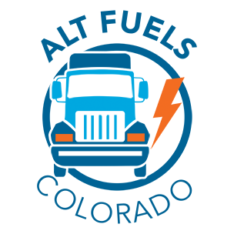
To improve air quality throughout the state of Colorado, the Regional Air Quality Council (RAQC) incentivized the replacement and scrappage of pre-2009 vehicles with fully Electric and Renewable Natural Gas (RNG) fleet vehicles. These funds were available to all public, private, and non-profit fleets statewide within Colorado.
Eligible Vehicles & Equipment
- Vehicles
- Class 8 Local Freight Trucks (Heavy-Duty) Greater than 33,000 lbs
- Class 4-7 Local Freight Trucks (Medium-Duty) Between 14,001 and 33,000 lbs
- Class 4-8 School & Intra-facility Shuttle Buses, Between 14,001 and 33,000 lbs
- Equipment
- Railroad Freight Switchers
- Airport Ground Support Equipment
- Heavy Forklifts, greater than 8,000 pound lift capacity
- Charging Equipment
- Additional funding may be available for associated electric vehicle charging stations (Level II & III only) if the vehicle or piece of equipment being purchased is electric. Please review the Program Guide for eligibility details. All chargers must be networked in order to report charging data to the program.
- Charging infrastructure not associated with an eligible vehicle purchase is not eligible for funding through this program (Please visit the Charge Ahead Colorado page to learn about funding for stand-alone electric vehicle charging stations).
- Eligible Fuels
- All electric
- CNG Vehicles, fueled with 100% RNG (Renewable Natural Gas)
Preparation Guide: https://raqc.egnyte.com/dl/j3WJiNyBHX
Program Guidance: https://raqc.egnyte.com/dl/ryNkMQYh78
Funding Calculator: https://raqc.egnyte.com/dl/WpvFDCEOxM/Funding_calculator.xlsx_
Background
Between 2014 and 2018, ALT Fuels Colorado operated with funding from the Federal Highway Administration’s (FHWA) Congestion Mitigation and Air Quality Improvement (CMAQ) program. With this funding, the program incentivized the purchased of over 800 alternatively fueled vehicles between September 2014 and January 2019. This funding is no longer available. In 2018 the ALT Fuels Colorado (AFC) program was allocated additional funding from a diesel emissions settlement. This funding is managed in partnership with the Colorado Department of Health and Environment, the Colorado Department of Transportation, and the Colorado Energy Office. For a list of projects awarded settlement funding from programs other than ALT Fuels Colorado, please click here.
The list of fleets awarded settlement funding through the ALT Fuels Colorado program are below.
Diesel Retrofit
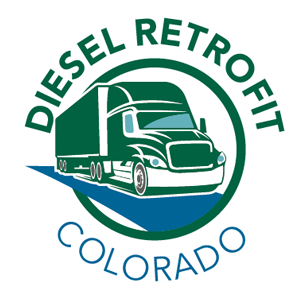
The Diesel Retrofit Colorado program was designed to help on- and off-road diesel operators voluntarily reduce diesel emissions while saving money. The program leveraged funds from a variety of sources to create effective projects that address the specific needs of fleets in the Denver Metro Area.
Eligibility
Interested fleets must operate in the nine county metro Denver area or along the Colorado Front Range and be registered, and in good standing, with the Colorado Secretary of State.
Technologies
The Diesel Retrofit Colorado program supported a range of technologies that include:
- Diesel Oxidation Catalysts (DOCs)
- Diesel Particulate Filters (DPFs)
- Auxiliary Power Units (APUs)
- Global Positioning Systems (GPS)
- Engine and Hydraulic Preheaters
- Trailer Fairings
- Technologies not listed above may also be eligible for program funding.
Charge Ahead Colorado

Charge Ahead Colorado funded vehicle charging stations. After many successful rounds of funding, the The Clorado Energy Office took over the management of the program. Read more here: https://energyoffice.colorado.gov/zero-emission-vehicles/grants-incentives/charge-ahead-colorado
Clean Air Fleets Newsroom
Colorado Energy Office Releases Colorado Electric Vehicle Plan 2020 (4/23/2020)
Today the Colorado Energy Office released the Colorado Electric Vehicle Plan 2020 at the April meeting of the Colorado Electric Vehicle Coalition.Transportation is one of the two largest sources of ozone precursors and reducing transportation emissions is a critical strategy to meet federal health-based air quality standards.
The RAQC played an important role in helping to craft this plan, along with partners at the Colorado Department of Transportation and Colorado Department of Public Health & Environment. You can find the full Colorado EV Plan 2020 here.
Gov. Hickenlooper and Colorado Energy Office award $10.33 million grant to build electric vehicle fast-charging stations across the state (11/30/2018)
Governor John Hickenlooper today announced a $10.33 million ALT Fuels Colorado grant through the Colorado Energy Office (CEO) to ChargePoint to build electric vehicle (EV) fast-charging stations along the state’s major transportation corridors. The fast-charging stations will be located in communities at 33 sites across six Colorado corridors comprised of Interstate, State and U.S. highways.
“Fast-charging stations give EV drivers the confidence to reliably travel to all corners of the state,” said Governor John Hickenlooper. “The future of EV travel in Colorado is bright thanks to this new partnership with ChargePoint.”
A lack of EV fast-charging stations along major transportation corridors limits the ability of EV drivers to engage in intra-and interstate travel and represents a major barrier for current and prospective EV owners. The Colorado Electric Vehicle Plan requires the State to build out Colorado’s EV fast-charging infrastructure through public-private partnerships. In April, CEO issued a request for ALT Fuels Colorado grant applications to directly address this requirement. This ALT Fuels Colorado grant also helps implement Colorado’s Beneficiary Mitigation Plan and the State’s commitment to the multi-state Regional Electric Vehicle West Memorandum of Understanding.
“ChargePoint brings technology built for today but capable of serving the next generation of EVs as well, said Colorado Energy Office Executive Director Kathleen Staks. “Charging stations will be placed with well-known site hosts in locations that provide easy access, proximity to amenities and 24/7 charging availability.”
ChargePoint is a national leader in EV charging. The company designs, builds and supports all the technology that powers its charging networks, from charging station hardware to energy management software.
“The transition to electric mobility is upon us, and pioneering states like Colorado are leading the way by supporting a broad charging network that enables long distance electric travel,” said Pasquale Romano, ChargePoint President and CEO. “We share the State of Colorado’s vision of a cleaner, more sustainable electric mobility future, and we look forward to working with the Colorado Energy Office to expand EV charging in the state.”
RAQC and CEO Open Charge Ahead Colorado Application for Electric Vehicle and Charging Station Funding (1/17/2018)
The Regional Air Quality Council (RAQC) and Colorado Energy Office (CEO) have opened the Charge Ahead Colorado application for electric vehicle (EV) and electric vehicle supply equipment (EVSE) funding. At this time, RAQC has funding for both EVSE and EVs for applicants within the Denver Metro Area (Adams, Arapahoe, Boulder, Broomfield, Denver, Douglas, Jefferson County and parts of Weld County including zip codes 80504, 80513, 80601, 80603, 80621, 80623, 80642, 80651). CEO has funding for EVSE for applicants outside the Denver Metro Area.
ELECTRIFY! Colorado Symposium Presentations (9/15/2017)
Thank you once more to everyone who attended the ELECTRIFY! Colorado Symposium. Below are the names of the presentations given at the symposium. Please contact Matt Mines for any additional questions about the Charge Ahead Colorado grant program.
- Charge Ahead Colorado (Steve McCannon, RAQC)
- City of Denver EV Efforts(Tyler Svitak, City & County of Denver)
- VW Settlement Update (Chris Colclasure, Colorado Department of Public Health & Environment)
- CEO Corridor Planning (Christian Williss, Colorado Energy Office)
- Road X(Peter Kozinski, Colorado Department of Transportation)
- RTD 16th Street Electric Mall Shuttle (Lou Ha, Regional Transportation District)
Charge Ahead Colorado Awarded Projects (6/27/2017)
Charge Ahead Colorado is a jointly managed program between the Regional Air Quality Council (RAQC) and the Colorado Energy Office (CEO) to incentivize the deployment of charging stations (EVSE) and electric vehicles (EV). Both RAQC and CEO are funding charging stations. RAQC funding is open to all public and private entities. Only RAQC is funding electric vehicle purchases. Electric vehicle funding is focused on those entities not eligible for the state income tax credit. All interested parties are required to submit the project application
Fruitdale School Lofts Receives Grant from Charge Ahead Colorado (3/21/2017)
National Drive Electric Week 2016 (9/8/2016)
Colorado residents and visitors will be “electrified” the week of Sept. 10-18 when National Drive Electric Week (NDEW) comes back to town. Attendees will get to experience first-hand some of the most popular electric vehicle (EV) models available by visiting one of the six events occurring throughout the metro area.
Charge Ahead Colorado (an EV and infrastructure grant funding program formed in partnership by the Regional Air Quality Council and the Colorado Energy Office) will be available to discuss the myths and benefits of EV ownership, workplace charging opportunities, charging station availability, and the financial and tax incentives associated with EV ownership.
Most area NDEW events give the opportunity for attendees to experience a ride and drive of select EVs and various entertainment activities. For a list of local NDEW events, visit https://driveelectricweek.org/index.php or the Colorado Electric Vehicle Coalition (CEVC) events calendar.
Denver Green Transportation Summit & Expo (7/8/2015)
Join the Regional Air Quality Council August 19th – 20th at the Crown Plaza Airport Hotel, 15500 E 40th Ave, Denver CO for this premier event.
Register before 7/15/15 with discount code gtsedenver and receive the early bird price of just $99!
RAQC hiring a Community Events Intern (4/21/2015)
Position description for Community Events Intern
To Apply: E-mail a current resume, cover letter detailing relevant experiences and qualifications, as they relate to the job duties listed above, and any school credit requirements. The initial application deadline is Friday, May 1st, 2015. The position will remain open and applications will be accepted until the position is filled.
The start date for the internship will be between May 1 and June 1. The internship will end between mid August and mid September. Please specify in your cover letter your dates of availability. Hours Per Week: 2-10. The majority of hours worked will be on site at weekend events with a small amount of office work.
Please submit requested application materials to Sara Goodwin, Communications Director, at sgoodwin@raqc.org No phone calls please.
ALT Fuels Colorado Alternative Fuel Vehicle Grant Program Workshop (8/6/2014)
The Regional Air Quality Council (RAQC) hosted a workshop introducing its ALT Fuels Colorado program on July 31, 2014 at the Adams 12 Conference Center. At this event, public, non-profit and private fleets were able to learn about funding amounts available and how the funding processes will work, hear from industry experts and fleets on the pros and cons of alternative fuel vehicles and how alternative fuels can work for their fleets, and talk to vendors and ask questions on vehicle currently available.
Please see below for presentations or click here for an agenda.
- ALT Fuels Colorado Vehicle Grant Program Funding – Steve McCannon, RAQC
- Noble Energy, Inc. RAQC Matching Grant Program Funding – Chris Rueter, Noble Energy, Inc.
- ALT Fuels Colorado Fueling Station Grant Program Overview – Wes Maurer, CEO
- DOLA Alternative Fuels Initiative– Charlie Unseld, DOLA
- NGV Fleet Case Study – Elizabeth Relford/Toby Taylor, Weld County
- Electric Vehicle (EV) 101 – Tyler Svitak, DMCCC
- Propane Vehicle 101 – Larry Osgood, Propane Education & Resource Council
- Propane Fleet Case Study – David Anderson, Adams 12 Five Star Schools
Thank you to everyone who made the workshop a success!
EV Drive and Charge Event, IBEW Hosts Kick-Off Event to Showcase EV’s and EVSE (1/10/2014)
The International Brotherhood of Electrical Workers (IBEW) is hosting an EV Drive and Charge Event. The kick-off event will showcase four Electric Vehicles charging simultaneously. Attendees will be able to charge and drive an EV or you may bring your own EV to charge for free.
IBEW was awarded with funding during our first Charge Ahead Colorado application round. We look forward to seeing their charging stations in use and hope you will join us!
When: 12 p.m. on Thursday, January 16th, 2014
Where: 5660 Logan Street, Denver, CO 80216
RAQC Announces Second Round of EV/EVSE Funding (5/5/2013)
The Regional Air Quality Council (RAQC) and Colorado Energy Office (CEO) have opened the second round application period for EV and EVSE funding. Applicants should note a number of changes have been made to the application. Applicants are encouraged to review the updated application carefully.
Based on applicant input during the question and answer session, the RAQC and CEO have made changes and offered clarifications to the EV and EVSE application. The updates are outlined in the Question and Answer Session Responses.
RAQC Receives $2.7M from EPA for Diesel (8/17/2010)
Denver, Colo. – The Regional Air Quality Council (RAQC), the lead air quality planning agency for the Denver metropolitan area and a leader in advancing clean diesel technologies, received a $2.7 million Diesel Emissions Reduction Act (DERA) grant from the Environmental Protection Agency (EPA) to pursue additional clean diesel outcomes.
Together with owners and operators of long haul fleets, the oil and gas industry, school districts, public works fleets, refuse haulers and other private fleets, RAQC will work to reduce harmful diesel emissions, greenhouse gases and fuel consumption in the ozone nonattainment area and along the Colorado Front Range. Efforts surrounding long haul and local trucking sectors will be focused on environmental justice areas around northeast Denver and Commerce City when possible.
“Cleaning up diesel vehicles continues to be a priority at both the State and Federal levels. The RAQC expects to maintain a strong diesel retrofit program using innovative technologies and reaching out to more fleets,” said Ken Lloyd, executive director of the RAQC.
The grant will fund projects in a number of targeted sectors, including an effort which will transform over-the-road trucks to improve efficiency and lower pollution through the installation of auxiliary power units (APUs) or fuel operated bunk heaters (FOH) that reduce the amount of time vehicles need to spend idling. Smartway trailer skirts or fairings and the option to install low rolling resistance tires will also be employed.
“The Regional Air Quality Council continues to find innovative ways to leverage clean diesel opportunities across a wide range of sources,” said Carol Rushin, EPA’s deputy regional administrator in Denver. “These funds will have an immediate impact on air quality in Front Range communities and beyond.”
On-Road retrofits will also be completed on vehicles from the oil and gas sector, private fleets, school districts and public works vehicles. Equipment that will be installed includes: new, cleaner vehicles for the oil & gas sector; diesel oxidation catalysts (DOCs) and closed crankcase filters (CCFs) that reduce tailpipe emissions; FOH for anti-idling; and hydraulic preheat and/or in cab heaters which also reduce the need to idle a vehicle to run power to the inside of the truck for heating, cooling, or electronics.
This project will coordinate a large collaboration of public and private entities to create a comprehensive and regional approach to reducing emissions and fuel usage. The RAQC will accomplish project objectives by working with partners and area trucking fleets to advance the goals of the Smartway Trucking Program; Encana Oil & Gas, Inc. to provide new, cleaner vehicles for operation in Colorado, and eight school districts to retrofit a number of school buses. In addition, RAQC will educate partners on simple voluntary measures and encourage fleets to adopt policies that reduce unnecessary diesel emissions. Partner fleets will be responsible for educating operators on retrofit equipment and idling reduction efforts.
The RAQC will also work with the Rocky Mountain Clean Diesel Collaborative (RMCDC). The RMCDC assists with fleet identification and outreach activities regarding program operations. The main goals in the RAQC’s diesel efforts are always to provide cost and fuel savings for fleets and to deliver cleaner air to the citizens of the Denver-metropolitan region.
Adams 14 Advances Student and Environment Health (5/24/2010)
Adams 14 Retrofits Buses to Improve Student and Environmental Health
Release Date: 05/04/2010
Adams 14 has retrofitted 13 District buses with new crankcase filtration systems and engine pre-heaters to reduce idle times, emissions and fuel costs. The results will be healthier students and drivers as well as a cleaner environment while buses take students to and from school.
Thomas Tucker, the district’s lead mechanic, oversaw the improvements, which were made this month through a partnership with the Denver-Based Regional Air Quality Council’s Clean Air Fleets Program, a public-private initiative that helps diesel operators reduce vehicle emissions while saving money. The program receives funding support from the Environmental Protection Agency and the Federal Highway Administration.

Steve McCannon, program manager for the Regional Air Quality Council believes public schools are an important partner. “District leadership and participation has been critical to the success of the program,” he said. “We have been amazed at school districts’ dedication to protecting the health of children.”
Adams 14 is pursuing opportunities to retrofit additional District buses in the future.
ALT Fuels Colorado announces second round of Settlement funding awardees (6/12/2019)
The Regional Air Quality Council (RAQC) and its program partners are pleased to announce the second round of projects funded through ALT Fuels Colorado, utilizing funds from the Volkswagen Diesel Emission Environmental Mitigation Trust.
RAQC and CEO Announce Latest Round of Charge Ahead Colorado Grant Recipients (4/4/2018)
The Colorado Energy Office and the Regional Air Quality Council today announced the latest round of Charge Ahead Colorado grant recipients. You can read the press release here.
RAQC Hiring Data/Program Analyst (12/22/2017)
Position Description: The qualified individual will work under the direction of the Program Director, and in collaboration with other staff, to collect data and evaluate air pollution reduction programs to quantify program benefits. The individual will utilize these evaluations to develop detailed program reporting. See position description for additional details.
To Apply: E-mail a current resume, cover letter and writing sample by 5:00 p.m. Monday, January 22, 2018 to Misty Howell, Office Manager at mhowell@raqc.org. No phone calls please.
RAQC To Host National Drive Electric Week Symposium & Ride-and-Drive Events (9/8/2017)
The RAQC’s Charge Ahead Colorado program has partnered with the City and County of Denver, Colorado Energy Office and Metro Denver Clean Cities to host two events on Tuesday, Sept. 12 during National Drive Electric Week. The events are:
- ELECTRIFY! Colorado Symposium – See Invite
- Electric Vehicle Car Show & Ride-And-Drive – See Press Release
Charge Ahead Colorado Receives DRCOG’s 2017 Metro Vision Award (5/5/2017)
Charge Ahead Colorado receives a 2017 Metro Vision Award from the Denver Regional Council of Governments (DRCOG). DRCOG’s Metro Vision Award program recognizes exemplary projects, plans and initiatives that significantly improve the quality of life in the Denver region and its communities.
“By designing a program that is flexible enough to support local government efforts to increase sustainability, reduce fleet costs, reduce air pollution or wire their workplaces to support employee adoption of EVs – the program isn’t just one size fits all,” said Steve McCannon, mobile sources program director for the Regional Air Quality Council.
Read the DRCOG press release here.
ALT Fuels Colorado Grant Now Open (3/14/2017)
House Bill 1332 approved by Colorado legislature (5/17/2016)
Are you in the market for an electric vehicle?
You’re in luck then. The process of claiming your tax credit became much easier this summer, with the passage of HB 1332. Beginning in January 2017, your electric vehicle tax credit will be assignable at point of sale. That means no more complicated calculations come April when taxes are due.
To read more about the bill and how it will affect you, please click here.
Ozone Season Kickoff Event: June 5th 11a.m. – 2 p.m. (5/29/2015)
The Regional Air Quality Council’s “Electrify Your Summer” ozone season kickoff event is Friday, June 5th at Market Street Plaza (16th St. & Market St.) from 11 a.m.-2 p.m.
Ground-level summer ozone season officially begins on June 1 and the adoption of electric vehicles (EVs) is one of many ozone-reducing behaviors, improving our regions air quality.
Visitors to the kickoff event will:
– Learn about the emerging technology of electric vehicles
– Learn about the economic and environmental benefits of electric vehicles
– Receive information on EV financial incentives, tax credits, and charging infrastructure
– See first-hand some of the most popular electric vehicle models available
– Have a chance to win an electric lawn mower and other prizes
– Interact with RAQC board members and industry experts
RAQC hiring a Program Coordinator (4/2/2015)
Position description for Program Coordinator
Position Description: Working under the direction of the Program Director the qualified individual selected for this position will primarily coordinate program implementation of the ALT Fuels Colorado Program. This position will also assist with the Charge Ahead Colorado Program, Clean Air Fleets Program, Repair Your Air Campaign and other special projects as developed. See position description for additional details.
To Apply: E-mail a current resume, cover letter and writing sample by 5:00 p.m. Friday, May 15, 2015 to Misty Howell, Office Manager at mhowell@raqc.org. No phone calls please.
Metro Residents Invited to Mow Down Pollution and Plug into Earth Friendly Living May 10th (5/10/2014)
Get Plugged into Earth-Friendly Living May 10th!
OzoneAware and Charge Ahead Colorado invite you to plug into earth friendly living at the Electrify Your Summer event on May 10th. It’s a fun, free community event featuring:
- The RAQC’s annual Mow Down Pollution law mower exchange
- Discounted Black and Decker electric garden tools
- Electric vehicle test drives provided by Tynan’s Nissan
- Electric bike test rides provided by OPTIBIKE
- Electronics recycling provided by Techno Rescue
- Music provided by KIMN Mix 100
- Free food and drink
- Information about air quality, electric cars and eco-friendly home improvements
- And more!
Come out and get amped!
When:
May 10th, 8 AM – 4 PM
(Please note that participation in Mow Down Pollution requires pre-registration.)
Where:
Dick’s Sporting Goods Field
6000 Victory Way, Commerce City, CO 80022
Parking Lot H — Just east of Quebec and 60th
Why:
The Denver Metro/Front Range region is out of compliance with federal standards for ground-level ozone, a harmful air pollutant caused when emissions from motor vehicles, lawn mowers, and other sources mix with heat and sunlight. Switching to electric lawn equipment and electric vehicles is one way for you to make a positive impact on air quality.
Old School Meets New, Adams 14 Celebrates Greener School Buses at Community Event (8/22/2013)
COMMERCE CITY, Colo. (August 22, 2013) – Adams County School District 14 (Adams 14) invites the community to celebrate the launch of three environmentally friendly propane school buses. These new buses are the result of funding awarded to Adams 14 by the Regional Air Quality Council (RAQC).
What: Celebration to highlight the new fleet of propane buses in Adams 14
- Free hot dogs, chips, and popsicles
- “Test ride” the new buses
- Informational booths
When: Saturday, Aug. 24, 2013, 11 a.m. to 1 p.m.
Where: Adams City High School, 7200 Quebec Parkway, Commerce City
In 2012, the District applied for and received funding from the RAQC that allowed Adams 14 to replace three older, high-polluting diesel buses with three propane buses. The addition of the new buses will both improve air quality and reduce fuel costs. Adams 14 is just the seventh district in Colorado to introduce propane school buses.
The District’s new buses, which are manufactured by Blue Bird, offer many benefits over conventionally fueled school buses. Not only do they reduce carbon monoxide, nitrogen oxide and total hydrocarbon emissions, but they also virtually eliminate particulate matter. Additionally, noise levels on the buses are decreased by as much as 50 percent when compared to diesel counterparts, which makes it easier to hear the children on board. Fuel costs are also reduced by 40 to 50 percent over diesel buses, and because propane autogas burns cleaner than gasoline or diesel, it results in less engine wear and tear and reduced maintenance costs.
Adams 14 transportation services manager Albert Francisco estimates that replacing the old buses with the new will, on an annual basis, reduce carbon dioxide (CO2) emissions by 35,800 pounds, save $12,000 in fuel cost and positively impact on-board interaction.
“We are pleased to offer improved air quality to our children and our community, as well as significant cost savings to our district, with the addition of these cleaner propane buses,” said Francisco. “We are grateful to the support of the RAQC in helping us make this happen.”
“Both the students and the drivers love the reduced noise,” Francisco continued. “And, because students don’t have to yell at each other to be heard, there is actually a decrease in student management issues.”
The District took possession of the buses in May; students began experiencing the new buses for the first time at the start of the new school year on August 12.
About Adams 14:
Adams 14 is Colorado’s 26th largest school district, and serves more than 7,500 students annually. Nestled in the historic community of Commerce City, Adams 14 strives to ensure academic success for every student by providing highly effective classroom instruction, supplemental enrichment opportunities and parent/family collaboration opportunities. To learn more about Adams 14, visit adams14.org.
About the Regional Air Quality Council:
The Regional Air Quality Council (RAQC) is the lead air quality planning agency for the seven‐county Denver metropolitan area. The Council’s main purpose is to develop plans and programs to keep the region in compliance with federal air quality standards, with significant input from area citizens, business, and local governments. The RAQC also develops and implements initiatives to help public and private on and off road operators voluntarily reduce emissions and fuel consumption. To learn more about the RAQC, visit www.raqc.org.
RAQC Announces EV/EVSE Funding (12/14/2012)
The RAQC is pleased to announce funding to support the acquisition of electric vehicles (EVs) and installation of electric vehicle charging stations (EVSE).
The RAQC and Colorado Energy Office (CEO) have partnered to provide this opportunity in an effort to improve air quality and encourage the deployment of electric vehicles across the State of Colorado.
Applicants should note a number of changes have been made to the application. Applicants are encouraged to review the updated application carefully.
RAQC Partners with City of Littleton on Hybrid Bus Project (8/11/2010)
Littleton, Colo., August 10,2010 – Mayor Doug Clark will accept the keys and a $40,000 check from representatives of the Regional Air Quality Council (RAQC) at a celebration to put into service two hybrid electric senior transportation buses on Tuesday, August 10 at 11 a.m. at the City of Littleton Service Center, 1800 West Belleview Avenue. Longtime Omnibus and Shopping Cart riders and drivers will be on hand, along with representatives of Azure Dynamics, manufacturers of the hybrid technology.
2010 Engine Standards Workshop (8/26/2009)
On August 26, 2009, public and private diesel fleets throughout the Denver Metro Area came together to learn about and discuss EPA’s upcoming 2010 Diesel Emissions Standards. The workshop, put on by the Regional Air Quality Council and the Colorado Department of Public Health and Environment, invited representatives from Cummins, Mack, and Navistar to discuss the heavy-duty diesel standards and explore SCR and EGR solutions.
ALT Fuels Colorado announces first round of Settlement funding awardees (3/26/2019)
The Regional Air Quality Council (RAQC) and its program partners are pleased to announce the first round of projects funded through ALT Fuels Colorado, utilizing funds from the Volkswagen Diesel Emission Environmental Mitigation Trust. A second call for ALT Fuels Colorado Mitigation Trust projects has taken place, and an updated awardee list will be posted once the funding for those projects are approved by the Trust.
RAQC and Partners Join Governor To Announce Colorado Electric Vehicle Plan (1/25/2018)
The RAQC and its partners joined Governor John Hickenlooper on Jan. 24 to announce the release of the Colorado Electric Vehicle (EV) Plan, delivering on a directive set forth in the July 2017 Executive Order, “Supporting Colorado’s Clean Energy Transition.” The plan was developed in partnership with the Colorado Energy Office (CEO), RAQC, Colorado Department of Public Health & Environment (CDPHE), and Colorado Department of Transportation (CDOT).
The plan details a series of actions supporting EV infrastructure along Colorado’s corridors. It also lays out goals to accelerate adoption of EVs and ensure Colorado remains a leader in the EV market.
RAQC Funding for Alternatively Fueled Trucks Highlighted in Boulder Daily Camera Article (12/18/2017)
A recent article in the Boulder Daily Camera – “Longmont second city in Colorado to convert sewage byproduct into fuel” – highlights RAQC funding for alternatively fueled trucks. You can read the article here.
RAQC/NREL Release Electric Vehicle Study (8/22/2017)
The RAQC, along with its partners – the U.S. Department of Energy’s National Renewable Energy Laboratory (NREL), Colorado Energy Office and Colorado Department of Transportation – released the findings of a new study on statewide priority electric vehicle (EV) charging locations: Electric Vehicles in Colorado: Anticipating Consumer Demand for Direct Current Fast Charging. See press release.
This report comes on the heels of a companion study released last week by the City and County of Denver’s Department of Environmental Health (DEH) – Denver’s Opportunity for Vehicle Electrification: Overcoming Charging Challenges to Maximize Air Quality Benefits – which was funded by a grant from the RAQC. See press release.
Wheat Ridge Fruitdale Lofts to feature solar-powered electric car charging station (4/4/2017)
For the full article featured in the Denver Post, click here.
Fleets Recognized for Commitment to Emission and Energy Reductions (10/12/2016)
At the Colorado Motor Carriers Association’s annual convention in Steamboat Springs, Colo. last month, the Regional Air Quality Council (RAQC) and Colorado Motor Carriers Association (CMCA) recognized two trucking fleets for their contributions and efforts toward reducing diesel emissions and energy utilization.
Charge Ahead Colorado to host inaugural Wired Workplace Event (10/19/2015)
Businesses are attracting talent, promoting sustainability, and exhibiting leadership by providing EV charging for the thousands of employees who drive plug-in electric vehicles in Colorado. Attend this free workshop on Oct. 27 from 4-6:30 p.m. to learn everything about workplace charging and end the day with a networking reception
RAQC Begins 8-Hour Ozone SIP Control Strategy Evaluation Effort (5/8/2015)
In 2012, the Denver Metro/North Front Range Area was designated as Marginal nonattainment for the 2008 National Ambient Air Quality Standard (NAAQS) for ozone. Based on a recent decision by the DC Circuit Court, the attainment deadline for the region is now July 20, 2015. Because the region did not demonstrate attainment by the end of the 2014 ozone season, the region is anticipating a “bump-up” by the U.S. Environmental Protection Agency (EPA) to a Moderate nonattainment area, which has an attainment deadline of July 20, 2018 and requires the development and submittal of an State Implementation Plan (SIP) for this standard.
As part of the SIP development process, a Reasonably Available Control Measures (RACM) analysis must be performed, which will demonstrate that the state has adopted all reasonably available control measures needed to meet the Reasonable Further Progress (RFP) requirements and demonstrate attainment as expeditiously as practicable. As part of this effort, the Regional Air Quality Council (RAQC) Board has formed three subcommittees to evaluate potential strategies for incorporation into the upcoming and/or future SIPs.
- Subcommittee 1: Stationary/Area Sources
- Subcommittee 2: Mobile Sources/Fuels
- Subcommittee 3: Transportation/Land Use/Pricing/Outreach
All subcommittee meetings are open to the public and interested stakeholders.
Future meeting dates:
| Subcommittee | Date | Time |
| Trans./Land Use/Pricing | Tues., Nov. 10th, 2015 | 9:30 – 11:00 AM |
Previous meeting dates:
| Subcommittee | Date | Time |
| Stationary/Area Sources | Thur., Sept. 24th 2015 | 1:00 – 3:00 PM |
| Stationary/Area Sources | Tues., May 26th 2015 | 1:00 – 3:00 PM |
| Mobile Sources/Fuels | Tues., Nov 3th 2015 | 9:30 – 11:00 AM |
| Mobile Sources/Fuels | Wed., May 27th 2015 | 8:00 – 10:00 AM |
| Trans./Land Use/Pricing | Mon., Oct 5th 2015 | 9:30 – 11:00 AM |
| Trans./Land Use/Pricing | Tues., August 25th 2015 | 9:00 – 10:30 AM |
| Trans./Land Use/Pricing | Fri., July 10th 2015 | 9:30 – 11:00 AM |
| Trans./Land Use/Pricing | Tues., June 2nd 2015 | 1:00 – 2:30 PM |
Please click here to be added to the RAQC email list to receive notifications about future meetings.
RAQC Announces Fifth Round ALT Fuels Colorado Awards (11/18/2014)
The Regional Air Quality Council (RAQC) is pleased to announce the fifth round of ALT Fuels Colorado program awardees.
Awarded Organizations
Round 5 – October 2015
- Allied Waste Transportation
- Colorado State Fleet
- Colorado Springs Utilities
- Douglas County School District
- Salida Del Sol Academy
- United Parcel Service, Inc.
- Weld County School District RE-1
- Weld County School District RE-6
Round 4 – July 2015
- Alpine Disposal
- City of Fort Collins
- Ruan Logistics Corporation
- St. Vrain Valley School District
- Weld County School District RE-3J
Round 3 – March 2015
- Allied Waste Transportation
- Boulder Valley School District
- City and County of Denver
- Mapleton Public Schools
- Penske Leasing and Rental Company
- United Parcel Service, Inc
- Weld County School District RE-9
Round 2 – November 2014
- Bimbo Bakeries
- Dillon Transport, Inc.
- Mapleton Public Schools
- Weld County School District RE-6
- Weld County School District RE-2
- Weld County School District RE-8
- Western Disposal
Round 1 – September 2014
- Black Hills Colorado Gas Utility Company
- City and County of Denver
- City of Fort Collins
- Colorado Springs Utilities
- Dillon Transport Inc.
- International School of Denver
- University School Foundation
- Waste Management of Colorado, Inc.
- Weld County School District RE-1
- Weld County School District RE-3J
- Weld Food Bank
- Western Disposal
The goal of the ALT Fuels Colorado Vehicle program is to improve air quality and incentivize the deployment of alternatively fueled vehicles in Colorado.
Charge Ahead Colorado Showcases Electric Vehicles at the Denver Auto Show (4/3/2014)
Charge Ahead Colorado will showcase electric vehicles at the Denver Auto Show April 9-13. Come see what electric vehicles are all about!
- Learn about the economic and environmental benefits of electric vehicles
- Get informed about financial incentives and station and at-home charging options
- Map charging station locations near home, workplace or travel routes
- See first-hand some of the most popular electric vehicle models available
Charge Ahead Colorado Program Brings 41 Electric Vehicle Charging Stations to State (4/23/2013)
Charge Ahead Colorado — a program formed in partnership by the Regional Air Quality Council (RAQC) and the Colorado Energy Office (CEO) to improve air quality and encourage the deployment of electric vehicles — has awarded 13 public entities and two not-for-profit organizations with grant funding to support the purchase of electric vehicles (EVs) and the expansion of EV infrastructure. Overall, the program will provide financial support for the purchase of 10 EV fleet vehicles and the construction of 41 new EV charging stations across the state.
The following entities have received funding from Charge Ahead Colorado:
- American Lung Association
- City of Arvada
- City of Aurora
- City of Boulder
- City of Colorado Springs
- City and County of Denver, Department of Environmental Health
- City of Durango
- City of Fort Collins
- City of Golden
- City of Lafayette
- City of Lakewood
- City of Loveland
- International Brotherhood of Electrical Workers (IBEW-68)
- Pueblo County
- Town of Carbondale
A list of projects and descriptions may be found here.
The new charging stations supported by the Charge Ahead Colorado Program will increase the total public charging stations in the state from 79 to 116. The 37 public EV charging stations being installed under the program will be placed in easily accessible locations such as court houses and transit centers. Many of them will offer free charging, or allow free charging when regular parking fees are paid. The additional four private charging stations will allow local governments and other entities to expand the use of EV in their fleets.
“While the number of public and private fleets and individuals interested in electric vehicles has grown in recent years, many have questioned whether there are enough charging stations to truly serve EV drivers,” said Ken Lloyd, executive director of the RAQC. “We are pleased to be partnering with CEO to offer funding that will help to alleviate these concerns and expand EV infrastructure to support the further adoption of EVs in the metro area and across the state. Our air quality will definitely benefit.”
Charge Ahead Colorado is made possible by two separate funding sources: 1. a federal Congestion Mitigation/Air Quality (CMAQ) grant awarded to the RAQC by the Federal Highway Administration and administered through the Denver Regional Council of Governments and the Colorado Department of Transportation, and 2. Colorado’s state legislature, who in 2009 established a fund within the CEO to administer grants to local governments for electric vehicle infrastructure. The program directly contributes to the RAQC’s efforts to improve the air quality in the seven-county Denver Metro region and CEO’s efforts to continue the upward trend of innovation in the diversity of transportation fuels in Colorado.
“Electric vehicles are a key component of Colorado’s effort to diversify our transportation fuels mix,” said Tom Hunt, Policy Programs Manager at the Colorado Energy Office. “We are happy to work with the RAQC and our local government partners to remove barriers to EV adoption by expanding access to charging stations.”
The RAQC has opened an additional opportunity for funding for EV and EV infrastructure that will close on July 1, 2013. Interested applicants are encouraged to visit www.cleanairfleets.org for more information.
Advanced Fleet Technology Forum (11/14/2012)
On November 14, 2012, public and private fleets came together at Sports Authority Stadium at Mile High to dig into dynamic fleet technologies and discover new equipment, upcoming programs and important funding opportunities available to fleets.
Click here to view a slideshow with pictures from the event.
Thank you to everyone who helped make the Advanced Fleet Technology Forum a success.
Denver Adds Four Hybrid Trucks to Fleet (6/17/2010)
The Denver Fleet Management Division recently replaced older units in its fleet with four Freightliner Business Class M2 106 Hybrid trucks as part of the City and County of Denver’s efforts to decrease energy demands and improve air quality.
One approach to reducing harmful emissions and improving the environment has been the “greening” of Denver’s fleet. The Denver Fleet Management Division, which maintains more than 1,900 vehicles and pieces of equipment for the city, began building its hybrid fleet with the purchase of light-duty hybrids. The four new Freightliner Business Class M2 106 Hybrid aerial bucket trucks will be used for forestry, traffic signal, and traffic sign repair.
“The Freightliner trucks mark our entry into medium-duty hybrid use, and are a welcome addition to our fleet,” said Ernie Ivy, fleet director, City and County of Denver. “With the new trucks, we will improve the way we deliver services to the citizens.”
The Freightliner Business Class M2 106 Hybrid features the Eaton Hybrid Electric parallel Drivetrain System that enables the truck to operate using the diesel engine alone, or in combination with the hybrid electric motor. This provides additional power to launch the vehicle and improve fuel economy in stop-and-go operations, in addition to reducing emissions and operating noise, particularly when the hybrid system powers the auxiliary equipment in ePTO mode, according to the manufacturer.
“We operate in neighborhoods all around Denver, so our goal is to reduce pollution and noise in the places where we live and work,” said Ivy. “The trucks also further our efforts to decrease greenhouse gas emissions and petroleum use.” Denver is receiving grants for the hybrid purchases and should recoup its outlay for the hybrid technology in five to seven years through increased fuel economy and lowered maintenance expenses.
RAQC Receives EPA Award (7/24/2009)
EPA awards $2.8 million in Recovery Act funding in Colorado to reduce diesel emissions and create jobs
Release date: 07/24/2009
Contact Information: Rebecca Russo, USEPA, 303-312-6757; Richard Mylott, USEPA, 303-312-6654
(Denver, Colo. – July 24, 2009) In a move that stands to create jobs, boost local economies, reduce diesel emissions and protect human health and the environment for people of Colorado, the U.S. Environmental Protection Agency has awarded $2.8 million in grants to the Denver Regional Air Quality Council, the Colorado Department of Public Health and Environment and the City and County of Denver to install clean diesel technologies on hundreds of trucks, buses and vehicles throughout the state. These clean diesel projects will create jobs while protecting Colorado’s air quality.
“These Recovery Act projects significantly advance efforts to secure clean-diesel technologies for our nation’s school buses, construction and farm equipment, long-haul trucks and other diesel vehicles,” said EPA Acting Regional Administrator, Carol Rushin. “In Colorado, our partners will use these funds to reduce toxic pollution from hundreds of vehicles and will help create and maintain jobs in communities across the state.”
The funds are provided under the American Reinvestment and Recovery Act (ARRA) of 2009 National Clean Diesel Funding Assistance Program. Under this funding competition, EPA Region 8 alone received more than 35 grant applications requesting more than $56 million to help fund clean diesel emissions projects.
The awards announced today were chosen to both maximize economic impact and emissions reductions. In addition to helping create and retain jobs, these clean diesel projects will help to reduce premature deaths, asthma attacks and other respiratory ailments, lost work days and many other health impacts every year.
Grant award recipients in Colorado include:
Denver Regional Air Quality Council: $1,250,000
This project will partner with owners and operators of over-the-road truck fleets, the oil and gas industry and one school district to install 100 auxiliary power units, 20 diesel oxidation catalysts, 56 fuel-operated heaters for anti-idling and in-cab heaters, 44 thermal coolers, 10 full sets of SmartWay low-rolling resistance tires and 20 SmartWay trailer gap fairings on vehicles throughout the state. The primary goal of these efforts is to reduce exposure to toxic emissions from diesel exhaust and to conserve diesel fuel. Contact: Sarah Anderson, Steve McCannon 303-629-5450
Colorado Department of Public Health and Environment, $850,000
This project will provide emissions control solutions for over-the-road diesel trucks. The funding will be used to partially pay for 180 auxiliary power units or battery air conditioning systems for long-haul trucks, with individual truck owners providing the remaining cost shares. This project will provide air quality benefits throughout Colorado and will provide significant fuel savings. Contact: Lisa Silva, 303-692-3119
City and County of Denver: $700,000
This project will retrofit 48 refuse vehicles with fuel-operated hydraulic and cab heaters, retrofit 9 snow plows with fuel operated cab heaters, retrofit 53 heavy duty diesel vehicles with diesel oxidation catalysts and closed crankcase filtration devices and utilize biodiesel fuel. This funding will pay for the full cost of retrofits and the incremental cost of biodiesel fuel. The primary goal of the project is to reduce exposure to toxic emissions from diesel exhaust. Contact: Sabrina Williams, 720-865-5477
Colorado will also benefit from a grant of $850,000 awarded to Oregon-based Cascade Sierra Solutions. Cascade Sierra Solutions will use the funds to provide emissions control solutions for the over-the road diesel trucks based in Colorado, Montana, South Dakota and Utah.
The Recovery Act allotted the National Clean Diesel Campaign (NCDC) a total of $300 million, of which the National Clean Diesel Funding Assistance program received $156 million to fund competitive grants across the nation. The Recovery Act also included $20 million for the National Clean Diesel Emerging Technology program grants and $30 million for the SmartWay Clean Diesel Finance program grants.
In addition, under the Act’s State Clean Diesel Grant program, a total of $88.2 million has been provided to States for clean diesel projects through a noncompetitive allocation process.
President Obama signed the American Recovery and Reinvestment Act of 2009 on February 17, 2009 and has directed that the Recovery Act be implemented with unprecedented transparency and accountability. To that end, the American people can see how every dollar is being invested at Recovery.gov.
For information on EPA’s implementation of the American Recovery and Reinvestment Act of 2009, visit: http://www.epa.gov/recovery
For information about EPA’s clean diesel initiatives, visit: http://www.epa.gov/cleandiesel


